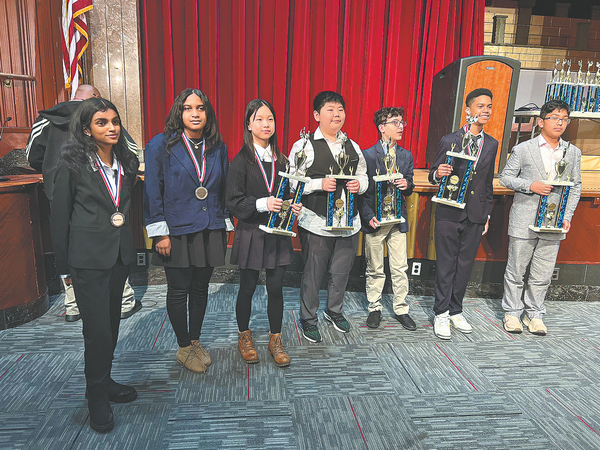Faced with hate, wise words are the weapon of choice


Bringing out qualities
However, after learning debating skills for a couple of weeks or months, "I can't get them to stop talking", Artoglou says.
"The personalities of these kids are just astounding. They make me laugh. They are just so funny and so opinionated. It's amazing to see."
Debate helps to bring out the qualities in a child that are already there, and they just need a little practice and encouragement to express those aspects of their personality, she says.
When Artoglou first started taking part in debate competitions at the Bronx High School of Science there were quite a few Asian students in her program, she says. However, as she ventured to other states and schools for competitions, she noticed that the number of Asian students began to dwindle. It became apparent that debate competitions were a very "white-dominated space".
"If you go to a debate competition, at least in my experience, when I went to debate competitions elsewhere, it was mostly white students. There weren't a ton of students of color."
Now, as a debate instructor at Early Scholars, Artoglou has a class of about 10 students, nine of whom are Asian.
Teaching Asian students has been "the majority of my experience in the past five years (since) I've been working only with Early Scholars", Artoglou says. "From what I've seen from our program and what's going on in our borough of Queens, I've been seeing a lot more participation of Asian students in the debate world."
Julio Cordero, another debate instructor at Early Scholars, says that since he was in middle school the many disparities between children of color and white children have been apparent.
When the young Latino attended debate tournaments on Saturdays, his coach would always emphasize the importance of dressing professionally, and he did not think twice about it. However, when he arrived at the tournaments he saw many white students wearing casual clothing.
When he asked his coach about it, his coach said, "That's just how it is, unfortunately."
"This bothers me," Cordero says. "I need more kids of color to be a part of the debate." He started to go back to campus after school to coach students of color in debating, and coached children of color free of charge during summer camps to encourage them to take part in debates. With the same aim in mind, he now teaches Asian American children.
Artoglou says she was always pleasantly surprised to see her students experiencing changes because she believes debate can equip young Asians with the tools they need to be effective advocates for themselves and their communities, especially in the face of the rising incidence of hate and discrimination against Asian Americans.
"I think the most important thing debate really can do for these students is to give them the confidence to say when something is wrong or to speak up when they see an injustice happening somewhere."
Most Asian American students are aware of the resentment some people harbor against Asian Americans. However, debate students are likely to know more about it "because they have been studying these social justice issues that have been under the surface for so long that they kind of had a better introduction to it", Artoglou says.
"So when it started to happen, it wasn't like it just came out of the blue. They had already been aware of many of the social justice issues that faced our society, so they were equipped to deal with it."
Cordero says, "Going to debate and debating against other kids makes you voice your opinion." When it comes to Asian hate incidents, young Asians learning debating skills are able to "speak on that issue and convince other people that this is wrong, and say and voice how they really want to feel", he says.
Debate gives young people the confidence to speak up and shows them "how to basically voice your opinion in a persuasive way so that people can really understand you", Cordero says.
Zhou says that when he was studying social anthropology and history of science at Harvard College, the first way in which debate helped him was that he had "a vocabulary around social theory and political understanding, to give a name to everyday events or news articles".
The term Asian American is in itself very homogenizing, Zhou says. "There are so many groups covered under that. People have different experiences." Speaking of his own experience as a Chinese American, debate training is helpful for "naming the world around you and identifying the issue, to begin with", he says.
"It's a diagnosis. I think at one point in my life I might have been reluctant to say anything or I might have just walked away, but now I think I would be more likely to call that out and say, 'This is a problem.' I'm not afraid to say something about it."




































